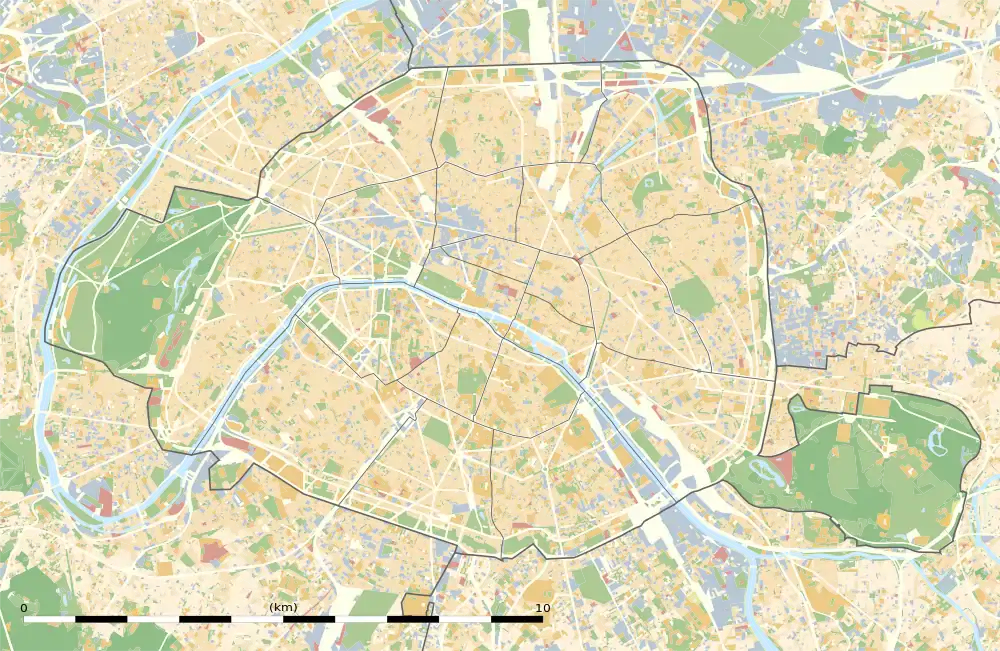 With mansion Marin-Delahaye on the left and mansion d'Aumont on the right. | |
 Shown within Paris | |
| Arrondissement | 9th |
|---|---|
| Quarter | Chaussée-d'Antin |
| Coordinates | 48°52′21.07″N 2°19′41.68″E / 48.8725194°N 2.3282444°E |
| From | Boulevard Haussmann |
| To | Rue Saint-Lazare |
| Construction | |
| Completion | 1780 |
The Rue de Caumartin in the 9th arrondissement of Paris received its name from Antoine-Louis Lefebvre de Caumartin, marquis de Saint-Ange, Comte de Moret (1725-1803), who was prévôt des marchands (1778-1784). He gave the authorization to open the street on 3 July 1779. Opened in 1780, the street extended from the rue Basse-du-Rempart located at the foot of the rampart (now Boulevard des Capucines) to rue Neuve-des-Mathurins through land acquired from the priests mathurins by Charles-Marin Delahaye, general-farmer. Further on the north, was the small street Thiroux opened in 1773 by President Thiroux of Arconvillé. And the small rue Sainte-Croix opened further on the north in 1780 through marshes and fields. The Rue de Caumartin absorbed them on 5 May 1849.[1]
The French architect Aubert built 28 mansions in the area, including the n°1 and n°2, on each side of the street at the beginning and the junction with the Boulevard des Capucines. They were decorated with figures in half relief, small amours, medallions, and various ornaments. Both included an outside rotunda on the street.[1]
| Located near the Métro stations: Havre - Caumartin, Saint-Lazare and Opéra. |
Notable places
- At n°1: Mansion Marin-Delahaye. Its roof bore a hanging gardens with shrubs, ponds, rocks, waterfalls and statues. And columns and pyramids to hide chimneys. Mirabeau lived here in 1789.[1]
- At n°2: Mansion d'Aumont, where lived from 1785 the maréchal d'Aumont, duke and pair de France, who joined the French revolution and was rewarded by commanding the Garde Nationale.
- At n°8: Stendhal wrote here La Chartreuse de Parme.[2] George Sand Also lived here for a time, until 1816.[3]
- At n°24: Former location of Le Grand Teddy cafe (closed in 1922), original location of The Grand Teddy tea-rooms paintings by Édouard Vuillard.
- At n°25: Theater Comédie-Caumartin.
- At n°26: Building where was installed the head office of the French Canal of Panama Company when it failed.[2]
- At n°63: Église Saint-Louis d'Antin.
- At n°65: Annex entrance of the Lycée Condorcet.
- At n°66: One time residence of Édouard de Max, theatre actor and Marcel Petiot, war-time serial killer.
- At n°69: Entrance of the Passage du Havre.
Notes
- 1 2 3 "Rue Caumartin". Le Paris Pittoresque (in French). Retrieved December 22, 2023.
- 1 2 "Cariboost File" (DOC).
- ↑ Sand, George (January 1991). Jurgrau, Thelma (ed.). Story of My Life: The Autobiography of George Sand. SUNY Press. ISBN 978-0-7914-0580-2. OCLC 43476648.